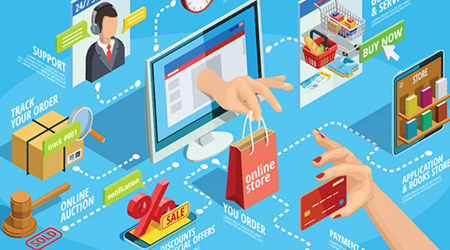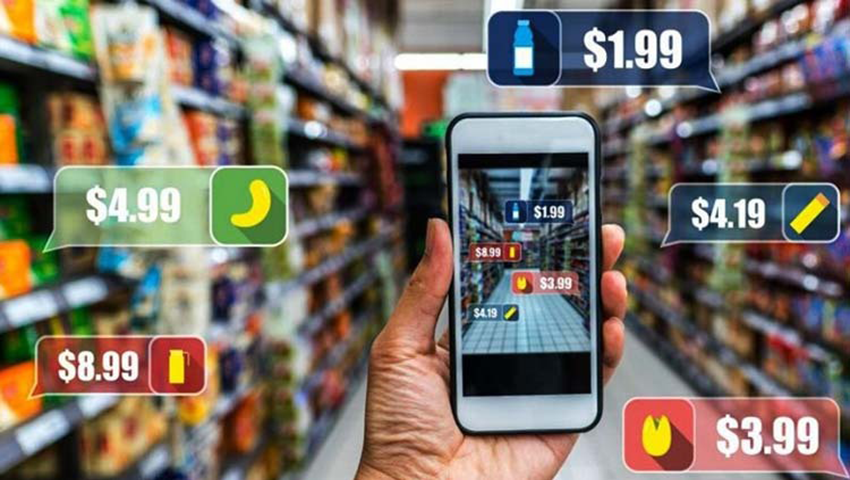Retail Processes are Being Redefined by Artificial Intelligence
 By Anolytics | 21 October, 2021 in AI in Retail | 3 mins read
By Anolytics | 21 October, 2021 in AI in Retail | 3 mins read

Retail and consumer goods companies have entered a new era of technology innovation, centered on intelligent automation powered by Artificial Intelligence and intelligent use of machines. AI-powered intelligent automation is already being adopted at a rapid pace by big global brands and retailers, and this trend has peaked in the past couple of years. With enormous amounts of data and rising customer demands, early adopters of AI in retail industry are seeing increased consumer loyalty and improved bottom-line outcomes.
AI in Retail Industry
The modern customer is technologically aware and has access to a wide range of shopping alternatives. With retail giants employing modern tech-driven processes to capture customer interest and deliver superior consumer experiences, and online retail ecosystem has come into being. Customer experience management, inventory management, and fraud detection are all manual and rule-based procedures. Traditional procedures no longer match the expectations of today’s customers, who demand increased access, flexibility, and speed.
Only those businesses who can effectively implement new technology to improve customer experiences while lowering costs will be able to compete in this competitive market. Retailers also have huge amounts of retail data to work upon and use intelligently for increasing sales and expanding operations. In addition to this, there are large amounts of historical data. With such a scenario unfolding, AI-powered by data science and machine learning have become key to the utilization of retail data and solving critical sectoral challenges for future sustainability.
Retail Aspects Influenced by AI
Three core aspects are influenced by AI in the retail sector.
● Customer experience: Increase customer loyalty by effectively personalizing and cross-selling the appropriate items to the right consumer at the right time.
● Operatibility: Boost fraud detection and inventory management to reduce fraud and increase profitability.
● Industry practices: Increase in-store efficiency and satisfaction by augmenting established practices with intelligent assistants and automating time-consuming operations, allowing sales personnel to spend more time with consumers.
Use Cases of AI in the retail
AI-Chatbots
Chatbots have been around for a while, however, the applicability of chatbots is waiting to be explored. Chatbots provide quick support and assistance to customers who visit online stores or ecommerce websites. More individuals shopping at home during the pandemic will require quick support, and round-the-clock service is the proper response. Hence, AI-based and NLP powered chatbots can classify customer intent with increased clarity and guide them for enhancing sales.
Customization
Retargeting consumers to making predictive suggestions are potent examples of AI-driven personalization in retail. A website user will spend time browsing products, visiting links, investigating various catalogue pages, and adding and deleting things from the shopping cart. This type of activity can provide useful information for e-commerce marketing. The AI customization engine examines visitor behaviour and adjusts ad placement accordingly. And the story continues on the internet, as items are suggested when a client clicks on other products.
When someone puts their shoes in a basket, an AI-powered engine may recommend a coat or pair of trousers that will complement them. This might happen either before or after a client completes the checkout process, especially if they’re close to obtaining free delivery.
Logistical Automation
Modern supply chains are complex networks of companies, people, activities, information, and resources that move a product or service from a supplier to a customer. Customers’ demands for transparency and prompt delivery assistance also pose additional hurdles for merchants and logistics providers. However, AI-enabled supply chain solutions have accelerated information exchange across organizational units and geographical regions, giving decision-makers an enterprise-wide perspective of the data they need in a fast, consistent, and accurate manner.
Moving Forward
AI will play a promising role in the retail business as more inventive technologies to incorporate with AI and into other subfields are being developed. As the retail industry continues to receive maximum customer engagement riding on the digital alternatives, it would be quite interesting to observe forthcoming changes in the industry. Meanwhile, incorporating AI into more critical areas of retail would be impossible unless machine learning engineers and data scientists have access to the proper quality and quantity of training data. Anolytics offers a full AI and machine learning training data solution. It specializes in picture annotation services for creating huge quantities of annotated photos for AI models created for the retail business. It can provide labelled data with the highest level of accuracy, allowing AI to be used in the retail industry.
Powered by Froala Editor
please contact our expert.
Talk to an Expert →
You might be interested

- AI in Retail 14 Jan, 2020
How AI is Changing the Retail Industry: Role and Impact with Use Cases
Artificial Intelligence (AI) in retail is changing this industry by playing a crucial role in the various key divisions.
Read More →
- AI in Retail 28 Mar, 2023
Complete Guide to AI & Machine Learning in Retail: Types & Use Cases
We have stepped into an era, where Machine learning (ML) and artificial intelligence (AI) play a huge role in the retail
Read More →